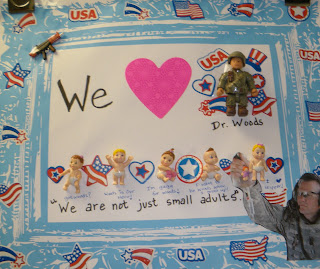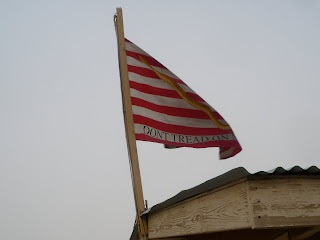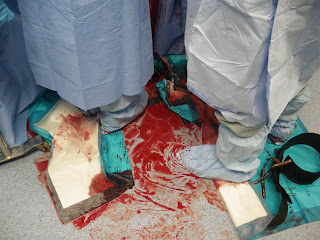25 August 2010
Kandahar, Afghanistan
I had my last overnight call in the ROLE-3 last night. There have been a lot of bittersweet "lasts" lately.
We played our last hockey match on Monday. Steve, our neurosurgeon, even played with broken ribs - from our hockey match the previous week. He said he just couldn't miss the occasion. We showed up in particular for Tracy, our Canadian "mayor of Kandahar." She is an ICU and trauma bay nurse who is pleasantly gregarious, seems to know everyone, and who has had a habit of getting us onto the hockey rink even when we might want to be sleeping after a night of call. Unfortunately on this day Tracy learned she was going home a day early. She was noticeably angry at the screw up: apparently someone had known about it for 3 weeks but hadn't bothered to tell her until the day before.
At Tracy's farewell lunch

Tracy couldn't play hockey on Monday as she had to pack and get ready to leave this place. It's a common theme - as much as one wants to get the hell out of here and back to a normal bed, a reasonable temperature, green grass, a cold beer - I could go on - one feels the gravitational pull of a tight knit group of friends and colleagues that one really doesn't want to leave behind. As Tracy told me, where else are you going to find a group that is so close, a group that shares tragedy in the horrible things we see, but also a group that gets together daily to break bread, play sports, drink yet another NA beer, or generally goof off (probably in an effort to forget the terrible things)? Many of these events occur on the same day. At home we have colleagues and may occasionally get together, but it takes effort, and it may take weeks of coordination to make a get-together happen. Here at KAF we all have a shared set of intense experiences, see each other every day, live in the same dorm... and we have become like a family after six months together. If you haven't been here it is difficult to relate.

On the day Tracy left we took her out to Echoes, the Dutch cafe with the cartoonishly rude staff. We ate together for one last time with our personal live wire, Tracy. When it was time to say good bye she was crying. We have made tentative reunion plans but we know it will never be the same.
We have been experiencing a region-wide dust storm the past couple of days. It is more dangerous to fly missions in the dust, so many of our patients that would normally be transferred by helo are grounded at the various forward operating bases located close by, attended to by lower echelons of care. At about midnight last night I received the page that 8 were inbound by Stryker or MRAP - vehicles used to carry troops around the countryside and armored to withstand IED blasts. We assembled at just before 1am to meet the hoard. After waiting an hour we were told that the patients wouldn't arrive for yet another hour, and that we would be paged again.
Our last cigar night?
I slept for that hour and dreamt about being a soldier in a ground war, being shot at over and over, with no place to take cover. I awoke, troubled and a little nauseated. I was thankful that I was only
dreaming about being shot at, lying in a bed. Our patients, who finally arrived at half past 3am,
were in fact being shot at in some miserable landscape several hours away by vehicle. When they finally arrived at ROLE-3, they had been traveling for hours in a hot and cramped vehicle.
Dropping off patients by vehicle, outside the trauma bay doors
They could have easily hit an IED on the way here. One of the wounded had his foot blown off. A young Afghan boy had somehow arrived with the group of soldiers, having fallen into a well (our third such victim in the past 3 months). Amazingly, only the boy ended up in the ICU. It was a strange way to end up my six months of call here. Is there some metaphor concerning falling into a well I am missing?
By morning I was wondering if the nightmares of being shot at were something I should be concerned about. Today I do not feel emotionally wounded after what I have seen. We have been told that the medical professionals who rotate in a hospital like the ROLE-3, and who have seen horrible things, occasionally have PTSD or PTSD-like illnesses upon their return home. From what I have been told, it is most often worst for the nurses, and most easily tolerated by the surgeons who operate and perhaps see the most carnage. I know it has been hard on some.
 The Commanding Officer being awarded the Boatswain's Pipe after the Change of Command ceremony
The Commanding Officer being awarded the Boatswain's Pipe after the Change of Command ceremony
Today is the day of the Change of Command. At today's morning report I witnessed some tears shed by those who are turning over the reigns to the new crew. I think the tears were a combination of exhaustion, joy in surviving, and joy in knowing we made a difference to scores of people, both Coalition soldiers and Afghan citizens. Our chief of trauma reviewed the numbers of people we had treated, the units of blood we transfused, the hundreds of orthopedic surgeries performed - many representing amputations, and other data. When the numbers scrolled across the screen I think it sunk in for all of us present: we put a lot of energy, effort, emotional toil... and on occasion, tears, into what we have accomplished and to what we have witnessed. It is no surprise to me that tears were shed this morning.
Incidentally we have another evolution to complete before going home designed to deal with these issues that many will carry back with them. It's called the Warrior Transition Program, which takes place in Kuwait. I understand it must be done and it probably is useful for some. I will be so preoccupied with thinking about getting home by that point I have to wonder if I can pay attention.
The Change of Command started at 10:30 this morning. As we were still under a cloud of dust, it was mercifully cool by Kandahar standards. After the benedictions, speeches, salutes and the final handing over of the flag, I got to shake the skipper's hand. I am sure I saw a tear in his eye too.




















































